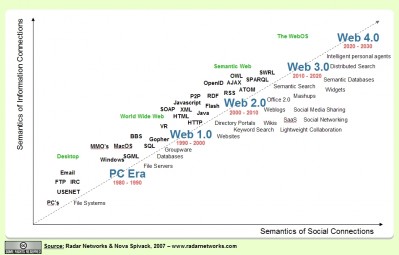
José has a great post on privacy, Privacy Schmivacy, which highlighted how algorithms can infer information about you rendering privacy settings in a certain context obsolete. The implication is the public-private divide and as José aptly puts it::
“This poses a paradox…if people freely give this information to a web site in exchange for the pleasures of friendship/connection, then are we obliged to regulate how the information is used by others? Isn’t a central element of connection the fact that you’re ‘putting yourself out there’ in public. Being public poses risks. Can we have the pleasures of the public with the protections of the private?”
I’ve been following developments on the semantic web, Web 3.0, which is all over the personal information and data about us that’s out there and can be used, as in Facebook profiles, and computers talking to computers to anticipate our needs. Ideally, it’s a benign Skynet from the Terminator movies.
While there have been discussions of a privacy ontology, this one from way back in 2002, the sticky wicket is that most users don’t understand the ramifications of using sites as we move towards the semantic web. For example, last July, Facebook’s algorithms were tweaked to be able to scour your contacts in your address book. You can opt out of this, but what about all the address books that you’re in? I’ve noticed that one’s Facebook friends list could construct one’s social graph for quite some time now, so I’m not surprised that social networks and profiling of users under lockdown can be done so readily and relatively accurately. That said, I think that users need to be more aware of the risks of engaging social media and not be lulled into a false sense of privacy. In terms of policy, I think more can and should be done to {a} limit what information is accessible and {b} companies and organizations need to be more up-front about what information is accessible and to whom, along with the ramifications of this. I firmly believe there is a knowledge gap between what users know and the reality of privacy on the web.
Should there be more regulation or more strict privacy policies by companies and organizations? I think that’s an interesting question. The stakes are the benefits of interacting with your identity, but the risks are the use of that information constructing that very identity. My initial reaction is no, but with a twist. I think there needs to be more information presented to users in lay language on the implications of using social media as the contextual web becomes more ubiquitous.
A more interesting issue, to me, isn’t the privacy issue, but how the semantic web can alter the social world and policy, which encompasses privacy and the nature of data in everyday life. One area in particular is what I see as an intrusion of the economic sphere on the personal through the use of data::
- Should your employer be privy to your credit rating or driving record?
- Should they be allowed to use public information about you {from databases or on social networking sites} as a condition of employment?
- Where does one’s role as a employee end and a private citizen begin? In other words, is speech less-than-free if you want to keep your job?
You can pose similar questions regarding the intersections of the personal and the political, the social, etc., with the main point being that these intersections are altering our everyday lives.
The semantic web is the churlish love child of Foucault’s surveillance and Derrida’s deconstruction.
Twitterversion:: Will the semantic web destroy privacy, given current policies & trends? How will it affect everyday life? #ThickCulture
Song:: Camera Obscura, ‘I Don’t Do Crowds’

Comments 2
rkatclu — April 8, 2010
Caution: use of this product may lead to chronic embarrassment, long hours spent staring at a glowing rectangle, and reduced employment prospects.
Daily Links for April 8th through April 9th | Akkam's Razor — April 21, 2010
[...] Identity & Semantic Web – [...]